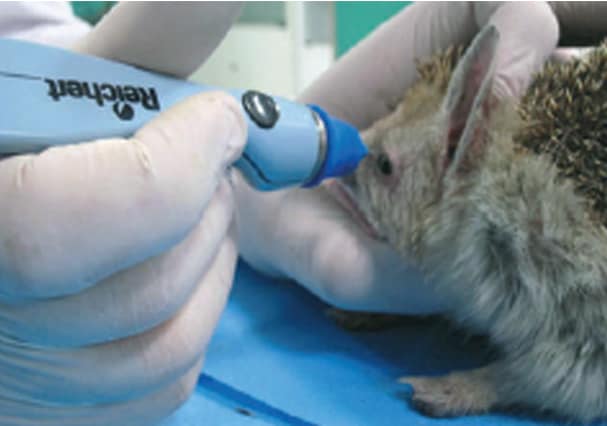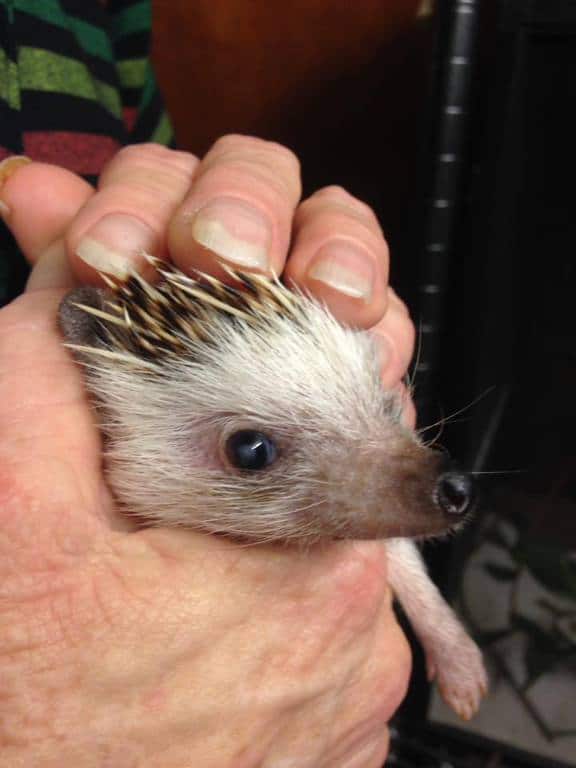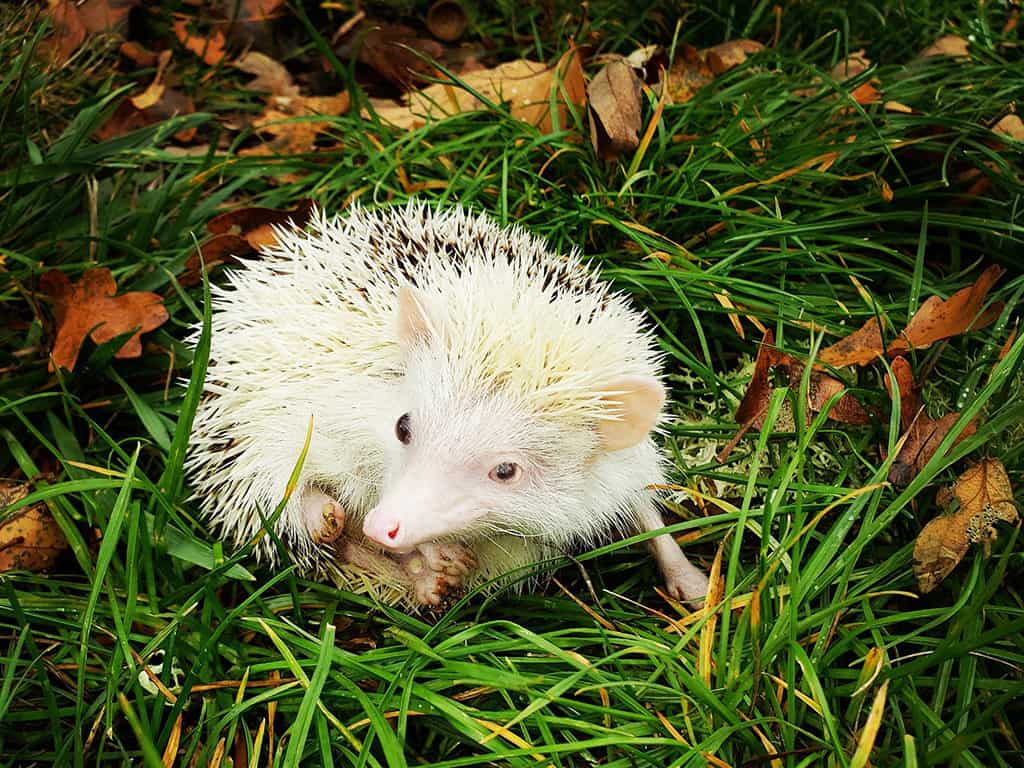If you're living with a blind hedgehog or if your hedgehog is in the process of going blind, it can be a little unsettling as a hedgie parent. In the various hedgehog groups, you can sense the caretaker's anxiety when their quill baby loses vision. Although it's not a widespread problem among hedgehogs, it does happen from time to time. We will discuss the various causes of hedgehog blindness and what you can do to help them live an almost normal life in many instances.
ACKNOWLEDGEMENT: A special thanks goes to Staci DeSchryver who shared her picture of one-eyed Willa sitting beneath a Christmas tree. It reminds us that even blind hedgehogs are a special gift from God.
Causes Of Hedgehog Blindness
Before we launch into how you can help your quill baby adapt to living without vision, we thought it would be good to understand the most common reasons why hedgehog blindness occurs. Sometimes, by understanding how the blindness occurred, it helps hedgie parents process their own feelings. It's not uncommon for hedgehog owners to wonder if they could have prevented the vision loss somehow. Some even feel guilt as if they should have been able to foresee it and somehow avert a tragic outcome. Let's examine the most common reasons a hedgehog can go blind.
Birth Defects
Sadly, birth defects can happen from established genetic traits or even a new mutation. It just happens sometimes and there's not really anything that can be done about it once it has happened. One thing that can be done prior to buying a baby hedgehog is to make sure that you are purchasing from an ethical breeder that keeps track of the lineage of their herd. This removes the risk of hedgehog blindness that might be caused by inbreeding. However, it doesn't remove the risk of a new genetic mutation or irresponsible breeding without knowledge of lineage. If you do happen to buy a hedgehog that is born blind, we strongly recommend that you never consider breeding it. Whether it's an established genetic trait or new genetic mutation that exists within your hedgie, propagating that would not be ethical.
Glaucoma
There are several different types of glaucoma, for which the fine details are outside the scope of this article. In summary of the glaucomas, they are a group of eye diseases that destroy the retina and optic disk over time. This results from intra-ocular pressure.

Unfortunately, it often leads to blindness and ocular pain. Even if early diagnosis were to occur, treatment would likely be futile and cost prohibitive. Glaucoma is often diagnosed using a process called tonometry, which is demonstrated in the picture.
Cataracts

Cataracts are probably one of the most common causes of hedgehog blindness. Since it occurs over time and is a gradual sight loss, a cataract-stricken hedgehog has greater adaptability. It's not like, today they see – tomorrow they can't. Psychologically it is less stressful on them. Usually cataracts occur in older hedgehogs, just like they usually occur in older humans.
Even if there was a animal hospital that did cataract surgery on hedgehogs, it wouldn't be feasible. In their advanced years, you are much better to adapt along with them and provide them with a quality life as they approach the end of their life cycle.
Ocular Trauma / Injury
Unfortunately, ocular injury from an incorrectly placed hanging water bottle often results in a blind hedgehog. Let's face it, hedgehogs aren't the most graceful creatures that God ever created. On top of that, their eyes protrude from very shallow eye sockets (also called orbits). This is the perfect recipe for disaster with a water bottle tube that is hanging at eye-height. If a water bottle is being used for a hedgehog, it should be hung so that the water tube is ABOVE their ability to walk or stumble into it. An inclined foot prop under the bottle, for their front feet to rest on, will help them reach the water tube and avoid eye injury. Ocular injury can happen by other mechanisms too, but injury-by-watter-bottle is the most common.
Ocular Proptosis
The term ocular proptosis is a medical term for the abnormal protrusion of the eye from its orbit (socket). With regard to hedgehogs, the prognosis is poor when it occurs and will often require removal of the eye (also called hedgehog enucleation). Hedgehogs that have lost a single eye due to proptosis are often lovingly called cyclops. While ocular injury can certainly cause proptosis, it isn't the only source. There are other diseases that can cause this to occur, one of which is a tumor. Whatever the root cause of the condition, it requires immediate veterinary care.
Severe mite infestations
When there is a severe infestation of mites, fungus and/or mange usually occurs as well. A particularly nasty mite known as Caparinia tripilis (aka Eurasian hedgehog mange mite), if left untreated, can result in quill loss, hair loss, and lesions around the eyes that lead to a blind hedgehog. While this mite is not native to the United States, there have been documented cases that show it has afflicted hedgehogs in the USA. [Reference: Gary R. Mullen, Barry M. OConnor, in Medical and Veterinary Entomology (Third Edition), 2019]
Neurological issues
One of our regular contributors of pictures and hedgehog experiences, Amber Petry, actually had a hedgehog that went blind. Soon after, he also lost his sense of smell, both from neurological issues. Unfortunately, Splotch, ate some polyester fibers from a blanket which got impacted in his bowel. By the time it was discovered, his liver was unable to prevent the toxic fibers from causing irreparable damage.

He has crossed over to hedgehog heaven at this point, but he never quite adjusted to being a blind hedgehog that couldn't smell his way around. If you're new to our website, you'll find that we're quite vocal about educating hedgehog owners about the toxicity of certain kinds of plastics. Did you know that most fleece is made from polyester (aka plastic)? Check out this article for the eye-opening truth about fleece.
Adaptations A Blind Hedgehog May Make
In order to compensate for the lack of sight, a blind hedgehog becomes even more dependent on their hearing and sense of smell than they already were. They heavily rely on these senses naturally. Since they have poor eyesight (once they gain vision after about two weeks old), their other senses become very attuned. Even though their normal vision is poor, it's still very effective at helping them see movement and shadows which helps their defense mechanism. Without their eyesight, they're left more vulnerable. A blind hedgehog can't see the curious cat that's ready to pounce.
Amber Petry runs the Louisiana Hedgehog Rescue Safe Home and has cared for several blind hedgehogs over the years. She was kind enough to share her experiences with us. Also, she graciously allowed us to use the video of Aegis (above). He is a well adapted blind hedgehog who listens closely for Amber's voice and wildly sniffs the air to confirm her scent (and treats).
Hedgehogs also have another way to help them maneuver through their world. Although with as many empty toilet paper rolls as we've seen on hedgie heads, we wonder if they even pay attention to what their whiskers tell them. Their whiskers around their face will help them sense proximity to objects, although some blind hedgehogs still bump into things.
Occasionally hedgie owners have seen their lap cactuses run in circles. But this does not happen in all cases. In the book, Hedgehogs by Nivel Reeves, he suggests that this behavior could also be caused by parasite-infested ears, ear infections, or infections of the nervous tissue (pg 172). It's not known exactly why it happens or what purpose it serves, if any.
Ways you Can Help Your Blind Hedgehog Cope

If your hedgehog previously had sight and has suddenly become blind, it can be a real challenge for them. There are many hedgehog owners that have said that since they have poor eyesight naturally, it's not a difficult transition. To that we say hogwash! If a hedgehog becomes blind over time from something like cataracts, then they have time to adjust. Because it occurs over time, it's not as challenging when they completely lose their vision. However, to suddenly be plunged into darkness is not something that any animal is going to easily transition into. It will take some patience on your part and some adaptions to help your sightless hedgie.
Downsize The Cage
If a multi-level cage was used prior to hedgehog's blindness, switch to a single level cage. A multi-level cage isn't going to be safe for a blind hedgehog to maneuver, even with safety rails. With everything on the same level, it will be easier for them to find what they want or need.
Keep It Consistent
Another way you can help is to consistently place your hedgehog's cage accessories in the same place each time you clean it or something in it. Many hedgehogs are creatures of habit, so you can definitely use this to help your hedgie adjust. While they'll definitely use their sense of smell, that's not going to prevent them from bumping into things. That's why consistency is important.
Use Blind-Friendly Placement of Water
While we're talking about cage accessories, if you previously used a water bottle, now's the time to stop. It is best to place your hedgehog's food and water side by side so they are easily found. Additionally, if you didn't previously have them…heavy-weighted dishes will help reduce the amount of tipping accidents.
Observe and Adjust
Finally, as we've often said before, if you don't have a cage camera, we highly recommend that you get one. They really are quite inexpensive! By reviewing the footage, you can identify any changes that may improve your hedgehog's quality of life. For instance, maybe they keep bumping into their hide-away and a snuggle sack would improve the situation. You can't know what to adjust if you don't see what they may be struggling with.
Final Thoughts On Owning A Blind Hedgehog
As humans, it isn't uncommon to grieve when something or someone we love loses abilities. My name is Diann and I have a handicapped daughter. Before she was born I had the usual hopes and dreams that a mother has for their child's life, but when she was born handicapped, those hopes and dreams were snatched away. I read an analogy that helped me put her life into perspective. It's like this:
You've dreamed about going to Italy and for months before the trip, you plan what you're going to see. What you're going to do. You anticipate all the new experiences you plan to enjoy. You board the plane excitedly, but for whatever reason, the plane has to detour and lands in Albania. But this isn't what you planned for! You haven't researched Albania! Where will you go? What will you do? This isn't at all what you planned for! It's not that Albania is any worse of a place to visit – it's just different than what you had planned for. There are still wonderful things to see and experiences to be had. You just need to realize that you can still enjoy something different than what you had originally anticipated if you open your mind to it.
Your huffy, puffy, little blind hedgehog is still there to love – and your experiences with them will still be special – they will just be different than you had originally anticipated. You both will be just fine!
AFFILIATE DISCLOSURE: Heavenly Hedgies is an Amazon Associate. We have partnered with them and other reputable merchants when they sell something that we feel will benefit our readers. By purchasing through our links, we may earn a small commission on sales, that helps us continue to provide informative and educational information for hedgie lovers. And the best part is that there is no additional cost to you. Thank you for being a loyal and supportive reader here at Heavenly Hedgies.


Does animals laying on fleece with miscrfibers from what is said, pose the same risk to their health like ingesting microfibers in the article linked?
I think you are referring to the article on Hedgehog Litter Types Compared. While I can’t cite any authoritative evidence that contact with polyester fleece is as dangerous as ingesting it, I have to ask, why take the risk? If given a choice between cotton fleece (which has no negative impacts) and polyester fleece, which has substantiated evidence of harm in our water system, which would you choose? Polyester is a man-made synthetic material made from purified terephthalic acid (PTA) or its dimethyl ester dimethyl terephthalate (DMT) and monoethylene glycol (MEG). I challenge readers to look up each of these compounds and read what they are.
I know that Quilly claws at his fleece as if he’s trying to dig a hole, which I’m sure produces fiber dust that he probably breathes in. We have no desire to scare the public or create a paranoid hedgie owner, but also feel that we have a moral responsibility to present whatever we find and let our audience follow their conscience. As a result of our research, we are making changes in what we allow Quilly to snuggle in. Every little improvement helps.
As usual Amber, your contribution, open-mindedness, and search for what’s best for the quality of life for hedgehogs is appreciated.